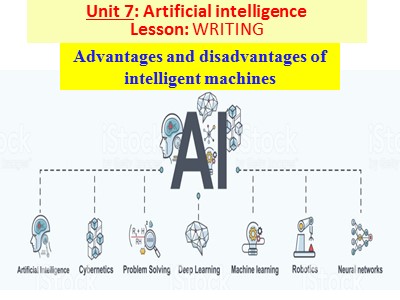Bài giảng môn Tiếng Anh Lớp 12 - Unit 7: Artificial intelligence - Lesson 6: Writing

III. Complete the outline. Then write an essay of 220-260 words to discuss the advantages and disadvantages of using intelligent robots, using the ideas in 2 and 3.
INTRODUCTION:
Robots are widely used in the food industry and medicine
They have advantages and disadvantages
BODY:
-advantages: reduce workforce in industries, help doctors to do surgery and do research
-disadvantages: become useless by power failure, attached and taken control of by hackers leading to the misuse of robotic devices
CONCLUSION:
Replace humans in stressful and dangerous work
The advantages outweigh the disadvantages
Bạn đang xem tài liệu "Bài giảng môn Tiếng Anh Lớp 12 - Unit 7: Artificial intelligence - Lesson 6: Writing", để tải tài liệu gốc về máy bạn click vào nút DOWNLOAD ở trên
Advantages and disadvantages of intelligent machinesUnit 7: Artificial intelligence Lesson: WRITINGVOCABULARY:- costly = expensive (adj): - upgrade (v)- precisely (adv)= exactly- error = fault (n)- defect (n): - workforce (n)- malware (n) =malicious-logic software: đắt: đúng, chính xác, cẩn thận: lỗi, sai sót: khuyết điểm: nâng cấp: lực lượng lao động: virut máy tínhI. Put the following phrases about intelligent robots in the appropriate columns.2. Complete tasks faster and more precisely than humans3. Have fewer errors and defects6. Reduce the workforce and cost of production1.Costly to train the operating staff and upgrade the computer programs4. Malfunctions due to computer system crashes5. Hackers taking control of computers and causing damageII. Combine the sentence halves.1. d2. f3. b4. a5. c6. eIII. Complete the outline. Then write an essay of 220-260 words to discuss the advantages and disadvantages of using intelligent robots, using the ideas in 2 and 3. BODY:-advantages: reduce workforce in industries, help doctors to do surgery and do research-disadvantages: become useless by power failure, attached and taken control of by hackers leading to the misuse of robotic devicesINTRODUCTION:Robots are widely used in the food industry and medicineThey have advantages and disadvantagesCONCLUSION:Replace humans in stressful and dangerous workThe advantages outweigh the disadvantagesSuggested answer: A.I. robots are widely used in areas such as the food industry and medicine. Obviously, they bring advantages as well as disadvantages. The advantages of intelligent robots are countless. Robotic machines can replace the human workforce in industrial assembly lines because they cannot only complete tasks faster than humans, but also make fewer errors. Furthermore, unlike humans, they take no breaks. In modern manufacturing plants, one out of every ten thousand workers is a robot. That is the reason why robots are so widely used in the automobile and electronics factories. In hospitals, A.I. robots can operate on patients, and help doctors to discover damaged organs in patients. They also help experts to do research on any serious side effects caused by the interactions of different medications on patients that can lead to complications in treatment. The disadvantages of A.I. are undeniable. Robots and other robotic machines are designed and programmed by humans. Therefore, they can be disabled due to power failure. In such cases, the computer systems will crash and A.I. devices will become useless machines. Another disadvantage is that the computer operating systems could be taken control of by hackers, causing misuse of robotic devices. This could potentially be dangerous to human lives. In conclusion, robots benefit humanity because the aim of their creation is to replace people in stressful and dangerous jobs, and make their lives better. The advantages of using intelligent robots outweigh the disadvantages. But relying on them completely is dangerous, because so much we can go wrong with them.
Tài liệu đính kèm:
 bai_giang_mon_tieng_anh_lop_12_unit_7_artificial_intelligenc.pptx
bai_giang_mon_tieng_anh_lop_12_unit_7_artificial_intelligenc.pptx



